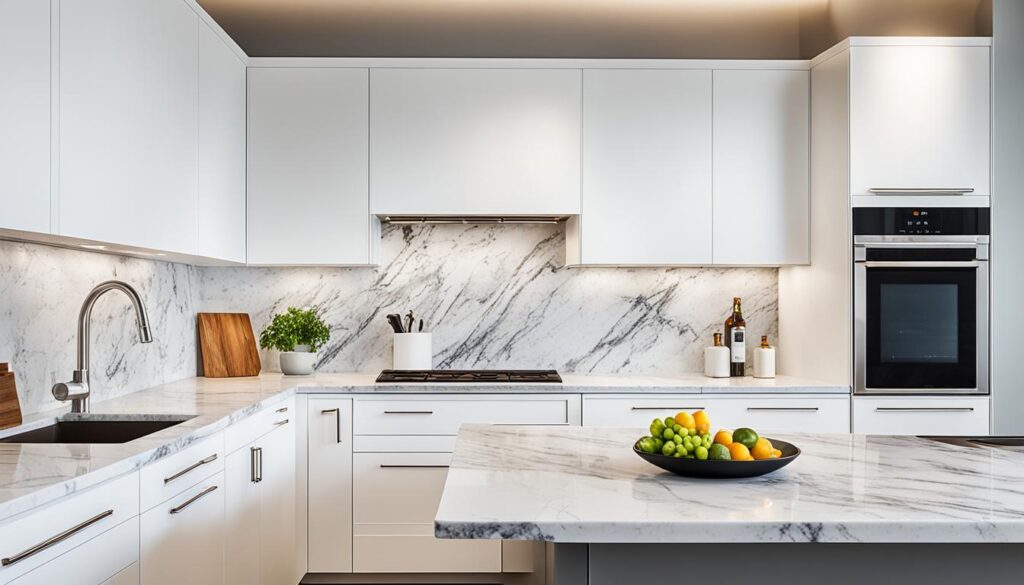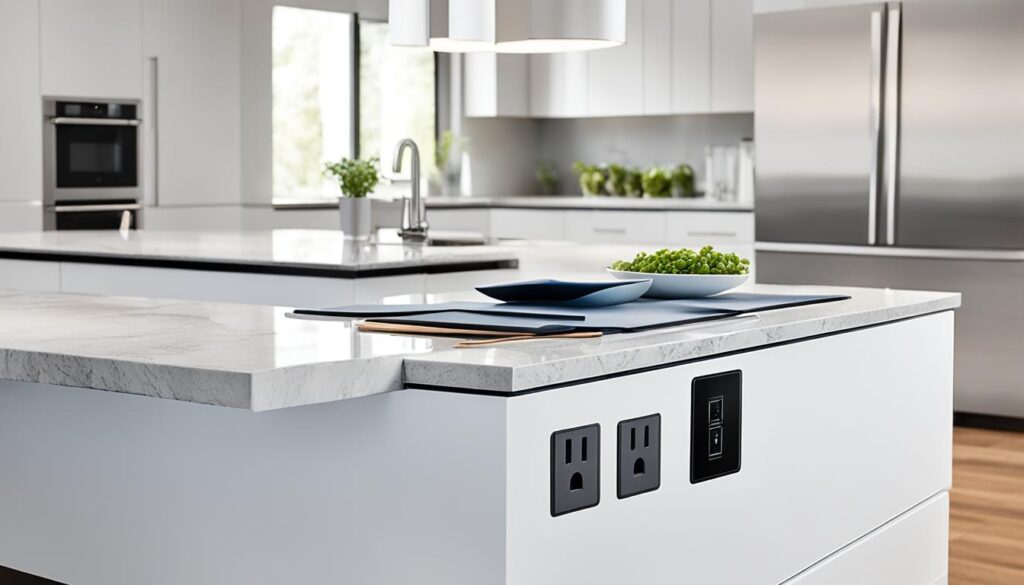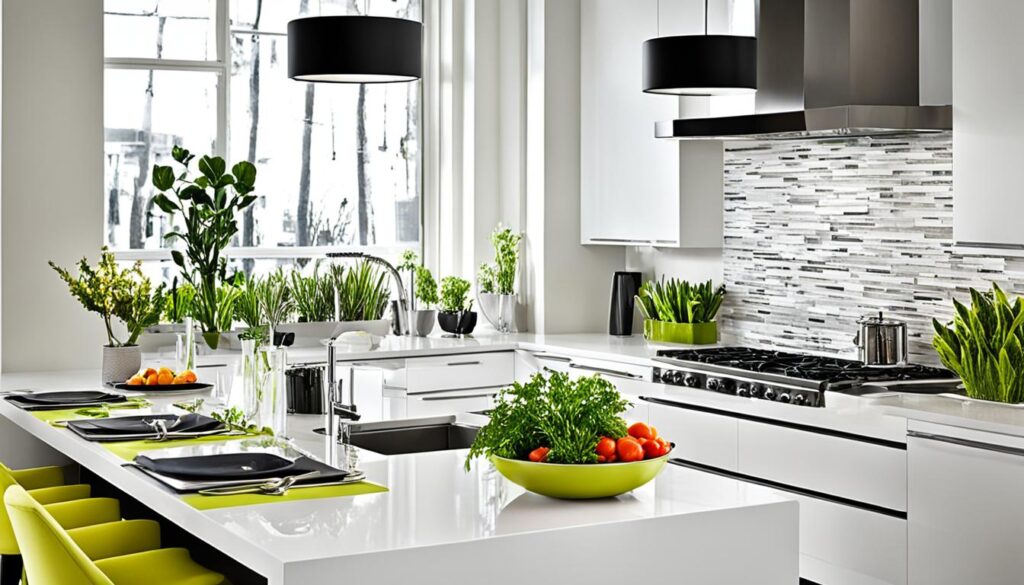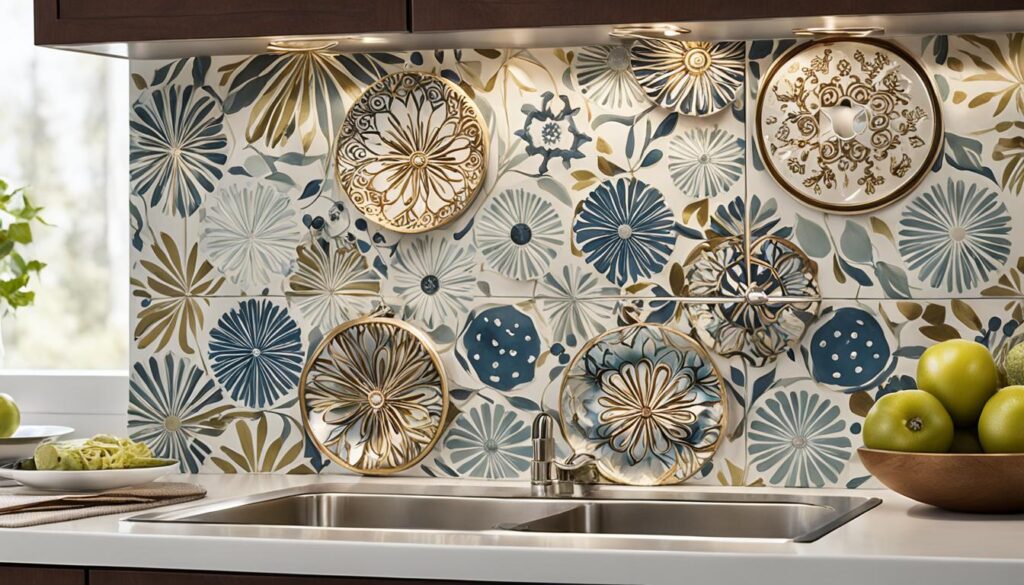When renovating or designing a kitchen, it’s important to consider the placement and appearance of electrical outlets. Unsightly outlets can disrupt the overall design and aesthetic of the kitchen. However, there are several clever ways to hide outlets in the kitchen and enhance the countertop area.
Key Takeaways:
- Camouflage outlets by matching the covers to the background color of the countertop or backsplash.
- Strategically place outlets horizontally on side walls or beneath upper cabinets to make them less noticeable.
- Incorporate power sources in kitchen islands with cabinet outlets or pop-up outlets.
- Cover outlets with accessories like cutting boards or artwork to minimize their visibility.
- Consider unique outlet solutions such as hidden outlets or customized faceplates for a seamless and high-end look.
Camouflage Your Outlets
When it comes to hiding outlets in your kitchen, one simple and effective technique is to camouflage them. By matching the outlet covers and outlets to the background color of your countertop or backsplash, you can seamlessly blend them into the surrounding surface.
If you have a black countertop, consider using black outlet covers that blend in seamlessly. Similarly, for a white tile backsplash, opt for white outlet covers that match the color scheme. This strategic choice of outlet covers helps maintain the visual harmony of your kitchen design.
But what if you want even more flexibility? Paintable outlet covers are an excellent option. These covers can be painted to match any color or pattern, allowing you to perfectly blend the outlets into the surrounding surface. Whether you have a vibrant backsplash or a patterned countertop, paintable outlet covers offer a customizable solution.
Trufig Flush Outlets: Camouflage at its Finest
For a truly seamless look, consider Trufig flush outlets. These outlets are designed to be mounted flush with the surrounding surface, creating a seamless appearance. Trufig outlets can also be painted to match the exact color and texture of your countertop or backsplash, ensuring complete camouflage.

Strategic Outlet Placement
When it comes to designing your kitchen, the placement of outlets is a crucial consideration. Not only do you need to adhere to electrical codes, but you also want to strategically position outlets to minimize their visibility and ensure convenience. Let’s explore some key factors to keep in mind when planning outlet placement in your kitchen.
Adhering to Electrical Codes
Electrical codes govern the number and type of outlets required in different areas of the kitchen. It’s important to familiarize yourself with these codes to ensure compliance and safety. One example is the use of Ground Fault Circuit Interrupter (GFCI) outlets, which are required near sinks to protect against electrical shock. By following electrical codes, you can ensure that your kitchen is both functional and safe.
Strategic Positioning for Minimal Visibility
In addition to adhering to electrical codes, strategic outlet positioning can help minimize their visibility in your kitchen design. Placing outlets horizontally on side walls, rather than vertically, can make them less noticeable. This horizontal outlet placement allows for a cleaner and more streamlined appearance, blending in seamlessly with the rest of the kitchen.
Another option for concealing outlets is to install them beneath upper cabinets. Under-cabinet power strips offer a convenient solution for accessing outlets without disrupting the countertop or backsplash. This placement keeps outlets hidden from direct view while providing easy access to power for appliances or charging stations.
Benefits of Strategic Outlet Placement
| Benefits | Description |
|---|---|
| Enhanced Aesthetics | Strategically placed outlets reduce their visibility, allowing your kitchen design to take center stage. |
| Improved Functionality | Outlets located beneath upper cabinets or in convenient horizontal positions provide easy access to power. |
| Minimized Clutter | By concealing outlets, you can maintain a clean and organized appearance in your kitchen. |
| Compliance with Codes | Strategic outlet placement ensures that you meet the necessary electrical code requirements. |
By considering outlet placement strategically, you can achieve a kitchen design that is both visually appealing and functional. Whether it’s horizontal outlet placement or under-cabinet power strips, these solutions offer a seamless integration of outlets into your kitchen design.
Power in Kitchen Islands
When it comes to kitchen islands, having convenient access to power outlets is essential. There are several clever solutions that can seamlessly integrate outlets into the design of your island without compromising its aesthetic appeal.
1. Cabinet Outlets
If you want to keep your outlets hidden and less visually distracting, consider incorporating cabinet outlets. By adding extra space at the ends of the island where the drawers are located, you can discreetly install outlets that are conveniently accessible yet blend in with the overall look of the island. This option allows for a clean and sleek appearance.
2. Pop-Up Outlets
For a more flexible solution, pop-up outlets offer a clever way to hide outlets when they’re not in use. These outlets are built into the surface of the kitchen island and can be easily raised or lowered with a simple push. When you need to plug in appliances or devices, simply pop up the outlets, and when you’re done, push them back down to maintain a clean and uncluttered countertop.
3. Undercounter Power Strips
Another innovative option is to install undercounter power strips beneath the overhang of the kitchen island. These power strips are discreetly hidden from view, providing easy access to outlets without compromising the island’s design. With undercounter power strips, you can conveniently plug in your appliances without the need for visible outlets on the island’s surface.

Benefits of Concealed Outlets
By incorporating outlets that are concealed within your kitchen island, you can maintain a sleek and clutter-free look in your kitchen. This not only enhances the visual appeal of your island but also ensures that your workspace remains unobstructed and tidy.
| Advantages | Considerations |
|---|---|
| Easily accessible outlets for appliances and devices. | Professional installation may be required. |
| Seamless integration with the island’s design. | Cost may be higher compared to standard outlets. |
| Clean and uncluttered appearance. | Ensure proper electrical codes are followed. |
When planning your kitchen island, consider incorporating these concealed outlet solutions to maintain the island’s design integrity while still providing convenient access to power.
Cover the Outlets with Accessories
If you have outlets that cannot be moved, there are creative ways to minimize their visibility. One effective method is to cover them with accessories.
An accessory that can serve a dual purpose in hiding outlets is a cutting board. By strategically placing a cutting board in front of the outlet, you can create a seamless look that blends with your kitchen countertop. This not only conceals the outlet but also provides a functional and practical solution. It’s important to ensure the cutting board is not covering the entire outlet to maintain easy access when needed.

Artwork is another way to disguise outlets while adding a touch of sophistication to your kitchen. Hang a piece of artwork that complements the overall design of your kitchen, and position it strategically to conceal the outlet. The artwork will draw attention away from the outlet, acting as a focal point and enhancing the aesthetic appeal of your kitchen. Make sure the artwork is securely hung and doesn’t interfere with the functionality of the outlet.
For a more decorative approach, you can explore ornamental outlet covers. These covers are specifically designed to add a stylish touch to your outlets while still allowing access when needed. They come in various designs, from intricate patterns to sleek and modern finishes, allowing you to find a cover that complements your kitchen decor. With ornamental outlet covers, you can transform a functional element into a decorative feature.
Outlet Cover Options
| Outlet Cover Type | Description |
|---|---|
| Cutting Board | A functional cover that blends with the countertop and provides easy access to the outlet. |
| Artwork | Adds a decorative touch to your kitchen while concealing the outlet. |
| Ornamental Outlet Covers | Stylish covers that transform outlets into decorative elements. |
By covering outlets with accessories such as cutting boards, artwork, or ornamental outlet covers, you can effectively hide them in plain sight and enhance the overall aesthetic of your kitchen. Choose the option that best suits your design preferences and enjoy a seamlessly integrated kitchen countertop area.
Embrace the Outlets
In some cases, it may be more practical to embrace the outlets and make them a part of the design. Instead of trying to hide them completely, you can integrate outlets into the overall aesthetic of your kitchen. By carefully considering their placement and appearance, you can turn outlets into a design feature that adds to the overall charm of your space.
To achieve a cohesive look, it’s important to ensure that outlets are placed symmetrically. This means positioning them evenly on either side of the countertop or backsplash. Symmetrical outlet placement creates balance and visual harmony, enhancing the overall appeal of your kitchen.
In addition to symmetrical placement, you can also use decorative outlet plates to elevate the appearance of your outlets. Rather than settling for plain and uninspiring outlet covers, you can choose switch plates in coordinating finishes that complement the rest of your kitchen’s design. For example, if your kitchen features brass hardware and fixtures, opt for decorative outlet plates in the same finish to make your outlets look intentional and coordinated.
By embracing the outlets and paying attention to symmetrical placement and decorative outlet plates, you can transform your outlets from practical necessities to stylish elements that contribute to the overall design of your kitchen.

Pros and Cons of Embracing the Outlets
| Pros | Cons |
|---|---|
| Integrates outlets into the design | May not be suitable for all kitchen styles |
| Creates a visually balanced look | Requires attention to placement and coordination |
| Allows for use of decorative outlet plates | May limit flexibility in outlet positioning |
Unique Outlet Solutions
When it comes to kitchen design, hidden outlets can provide a customized and seamless look. Whether you’re aiming for a minimalist aesthetic or prefer outlets that blend in with your surroundings, there are several unique outlet solutions to consider.
Pop-out outlets are an excellent choice for those seeking nearly invisible options. These outlets can be installed in walls or cabinetry, allowing them to remain discreet and hidden from view. With pop-out outlets, you can maintain a clean and cohesive look in your kitchen without sacrificing functionality.
Another option to achieve a seamless appearance is by using flush-mount outlets. Brands like Trufig and DesignMod offer flush-mount outlets that can be painted to blend in with the surrounding surface. This allows you to match the outlet to your countertop or backsplash, creating a harmonious and cohesive design.
If you’re looking to add a touch of luxury to your kitchen, consider designer outlet options from companies like Forbes & Lomax. These outlets come in elegant finishes and provide a high-end aesthetic that elevates the overall look of your kitchen.
For those who prefer a more minimalistic approach, there are self-contained receptacles and flush-mount systems available that eliminate the need for faceplates. These options provide a clean and streamlined look, enhancing the overall design of your kitchen.
No matter your design preference or budget, there are hidden outlet solutions available to suit your needs. By incorporating pop-out outlets, flush-mount outlets, customized faceplates, or luxury outlet options into your kitchen design, you can create a space that seamlessly integrates functionality with style.
With these unique outlet solutions, you can achieve a kitchen that not only meets your practical needs but also showcases your personal style and attention to detail. Don’t let unsightly outlets disrupt the aesthetic of your kitchen. Explore these hidden outlet options to create a space that is both functional and visually appealing.
Conclusion
When it comes to creating a seamless kitchen design, hiding outlets is an important consideration. Fortunately, there are a variety of kitchen outlet solutions available that can cater to your design preferences and budget. From simple camouflage techniques, like matching outlet covers to the countertop or backsplash, to more advanced hidden outlet systems, you can find the perfect solution to integrate outlets into your kitchen without compromising aesthetics.
During the planning and remodeling process, it’s crucial to think strategically about outlet placement and appearance. Adhering to electrical codes while strategically positioning outlets horizontally on side walls or beneath upper cabinets can minimize their visibility. In kitchen islands, options like cabinet outlets or pop-up outlets can add functionality without detracting from the island’s design.
In some cases, you may want to embrace the outlets as part of your kitchen design. Symmetrical outlet placement and decorative outlet plates can turn outlets into intentional design elements. Alternatively, if you want a more customized and luxurious look, hidden outlet solutions like pop-out outlets, flush-mount outlets, or designer outlet options are available.
Ultimately, the key is to find a kitchen outlet solution that suits your specific needs and preferences. By carefully considering the placement and appearance of outlets, you can achieve a cohesive and aesthetically pleasing kitchen design that seamlessly integrates outlets.

